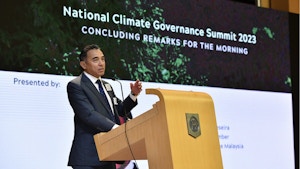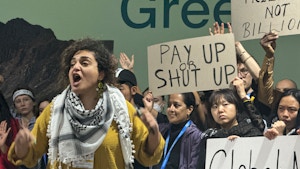The Philippines has been selected to host the board of a global fund aimed at helping vulnerable nations cope with climate risks.
To continue reading, subscribe to Eco‑Business.
There's something for everyone. We offer a range of subscription plans.
- Access our stories and receive our Insights Weekly newsletter with the free EB Member plan.
- Unlock unlimited access to our content and archive with EB Circle.
- Publish your content with EB Premium.
The loss and damage fund is a global finance mechanism set up at the COP28 talks in Dubai last year, to provide compensation for losses and damages from natural disasters caused by climate change. The decision on who to host the fund was announced this week, following closed-door deliberations at the board’s second meeting held in Incheon, South Korea.
“We fully appreciate the level of trust bestowed on our country to serve as the host of the loss and damage fund board. We do not take this matter lightly, and we commit to fully comply with the undertaking and promises made in the bid of the Philippines,” said Mark Dennis Joven, Philippines’ representative to the loss and damage fund board, at the meeting. The archipelagic state has a seat on the board.
As host country, the Philippines will sign legal agreements, provide diplomatic immunity for the board, and arrange for visas and other logistics required for member countries attending official meetings.
Its role as host does not offer the Philippines priority in accessing climate funds, but will give the climate-vulnerable nation “more opportunities to influence” the policy-setting process for the fund,” said Rosa Perez, an independent climate change specialist, who advises the Philippine delegation at climate summits. Perez added that the country has more experience and expertise in climate and disaster risks-related issues.

Mark Dennis Joven delivers a speech after the Philippines is announced as host country of the loss and damage board. Image: UNFCCC
As of December 2023, wealthy countries most responsible for the climate emergency have pledged a combined total of over US$700 million to the fund. It is the equivalent of less than 0.2 per cent of the irreversible economic and non-economic losses developing countries are facing from global heating every year.
The loss and damage fund board is tasked to operationalise the fund. This includes deciding which countries access the funds and how to mobilise the money for marginalised communities.
Claire Miranda, climate justice advocate at the Asian Peoples Movement on Debt and Development (APMDD), said that there is no “practical” benefit for the Philippines as host of the loss and damage fund board, but the selection demonstrates that the country “stands out as a leading advocate for climate action”, particularly in addressing the issue of loss and damage. APMDD is a regional alliance of 50 member organisations and movements.
Miranda believes that the choice of the Philippines as host also considers logistical arrangements. Eastern Carribean island Barbados was a strong contender in the bid but delegates attending board meetings would have to travel to the United States to get to the meeting venue, and visa entries might be difficult for some, she said.
Other than Barbados, Antigua and Barbuda, Armenia, the Bahamas, Eswatini, Kenya and Togo also submitted applications to host the fund’s board.

The second board meeting for the loss and damage fund was held in Incheon, South Korea on 9 July 2024. Image: UNFCCC
Due to its geographical location, the Philippines is hit on average by more than 20 tropical storms a year and is prone to earthquakes and other natural disasters. At COP, the Philippine delegation has traditionally been vocal about loss and damage compensation. In 2013, after Typhoon Haiyan, the deadliest cyclone to hit the archipelago, the Philippine delegation pushed for more action to resolve a deadlock at the climate talks at COP19 in Warsaw, Poland.
Naderev Saño, then the Philippines lead negotiator and its climate change commissioner, said he would fast for the duration of the two-week negotiations, until meaningful pledges were made on climate finance, and a loss and damage mechanism agreed on. Saño’s actions in part led to the establishment of the Warsaw International Mechanism for Loss and Damage at COP19.
World Bank’s role as interim funder still a concern
While the Philippines will serve as the board’s host, the fund’s secretariat will be hosted by World Bank, which is headquartered in Washington DC, for the next four years. Its appointment as secretariat and trustee of the fund has been a point of contention with some developing countries concerned that this would provide donor countries with considerable influence over how the fund is disbursed, given that World Bank’s presidents are appointed by the United States.
This is despite conditions already set at COP28 for governments and organisations working with vulnerable communities to receive funding directly, without having to go through intermediaries like multilateral development banks or United Nations agencies.
“The World Bank is dominated by the governments of developed countries, making it unfit to run a fund whose primary financial instrument should be grants, not loans, and whose mission is to serve the self-determined needs of developing countries,” said Lidy Nacpil, APMDD coordinator.
For now, the Global South is still pushing for the fund’s independence from the World Bank, and has cited the bank’s history for financing fossil fuel projects as another reason for their rejection of the decision to have the multilateral bank host the loss and damage fund’s secretariat.
“The Philippines must stand firm for a loss and damage fund that is democratic and independent of the World Bank. As interim host, the World Bank should not compromise the integrity of the fund’s operations and decision-making,” Nacpil said.














